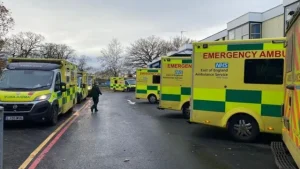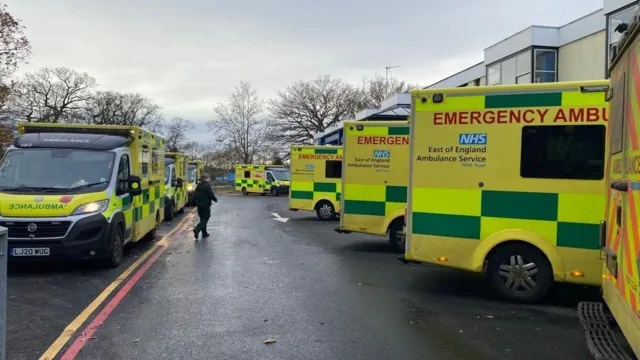
By Adeyemi Adekunle
Hospitals across the East of England are grappling with a staggering fivefold increase in flu-related hospitalizations compared to the same time last year, according to newly released figures. The surge has pushed health services in the region to breaking point, with ambulances queuing for hours outside emergency departments and critical care beds filling at an unprecedented rate.
Data from 28 December 2024 reveals that 506 patients were hospitalized with flu across 13 trusts spanning Bedfordshire, Buckinghamshire, Cambridgeshire, Essex, Hertfordshire, Norfolk, Peterborough, and Suffolk.
This represents a dramatic jump from the 103 patients recorded on the same day in 2023. Compounding the crisis, critical care units have seen the number of flu patients triple, with 21 individuals now requiring intensive treatment compared to just seven a year ago.
The East of England Ambulance Service Trust (EEAST) is struggling to keep pace with the surge in demand. Ambulance handover delays have worsened significantly, with 32.7% of ambulances waiting more than an hour to offload patients at hospitals—a sharp rise from 22.6% the previous year.
Some trusts, including Norfolk and Norwich University Hospital and Princess Alexandra Hospital in Essex, have reported even more alarming delays, with 68.2% of ambulance handovers exceeding the one-hour mark.
The mounting strain prompted EEAST to declare its highest alert level on New Year’s Eve, citing an “unprecedented level” of 999 calls. The situation reflects a broader winter crisis fueled by a spike in seasonal viruses, including flu, RSV, norovirus, and lingering Covid-19 cases.
Hospitals across the region have implemented emergency measures to curb the spread of infection and manage patient flow. Tighter visiting restrictions and mandatory mask-wearing policies have been reinstated, underscoring the severity of the situation.
Neill Moloney, chief executive of EEAST, expressed deep regret over the delays in care caused by the exceptional demand. “We deeply regret that the exceptional pressure on the NHS during this very busy festive period has caused some patients to experience longer waits for an ambulance than they should. We sincerely apologise to everyone affected and fully recognise the distress this causes,” Moloney said.
He added that teams have been working tirelessly to prioritize urgent cases while collaborating with hospital partners to reduce handover delays and improve response times. Despite these efforts, the system remains overwhelmed.
Prof. Julian Redhead, NHS National Clinical Director for Urgent and Emergency Care, described the rise in flu cases as “very concerning.” He also pointed to the added burden of other seasonal illnesses, warning that the convergence of multiple viruses was placing extraordinary pressure on health services.
The East of England, like much of the UK, is facing what health officials describe as one of the most challenging winters in recent history. With flu hospitalizations at record highs and ambulance services stretched thin, patients and healthcare workers alike are bearing the brunt of a crisis that shows no immediate signs of abating.
This year’s flu wave has exposed significant vulnerabilities in the region’s healthcare infrastructure. Ambulances queued outside hospitals for hours have become a grim symbol of the strain on the system, with many patients left waiting in pain and uncertainty.
The delays also have a knock-on effect, reducing the availability of ambulances for other emergencies and putting lives at risk.
The surge in flu cases has not only overwhelmed hospitals but also highlighted the broader challenges facing the NHS, including staff shortages, limited resources, and an aging population more susceptible to severe respiratory infections. Health experts are calling for urgent action to address these systemic issues and bolster the capacity of healthcare services during peak demand periods.
In the meantime, healthcare leaders are urging the public to take precautions to reduce the spread of illness. These include getting vaccinated against flu and Covid-19, practicing good hand hygiene, and staying home when sick. Officials are also asking people to consider alternatives to A&E for non-urgent health concerns, such as seeking advice from pharmacists or using NHS 111 services.
As the East of England braces for the weeks ahead, the focus remains on managing the immediate crisis while preparing for potential further spikes in hospitalizations. For frontline healthcare workers, the priority is clear: deliver care to those who need it most while navigating the extraordinary challenges of a winter unlike any other.
The situation as reveals the importance of investing in resilient healthcare systems capable of withstanding surges in demand. For now, the region’s hospitals and ambulance services continue to operate under immense pressure, with no respite in sight.




